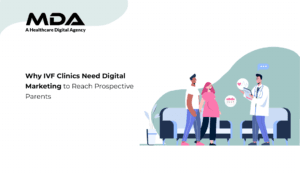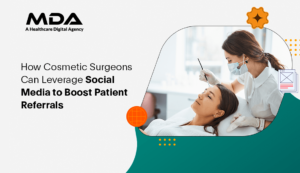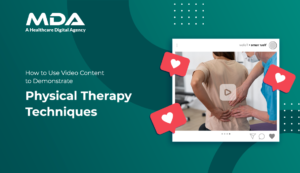Introduction:
Outreach of sensitive health topics necessitates a careful approach due to consideration of the emotions surrounding these topics. Whether it’s discussing mental health problems, long-term issues, or treatment of patients in their final months or weeks, there are certain discursive aspects of healthcare discussion that require sensitivity, understanding, and a clear-cut conceptual approach. Here, readers will learn best practices for promotional communication in relation to sensitive health topics by the well-known Healthcare Digital Marketing Agency– Medi Digi Agency.
Understanding the Landscape of Sensitive Healthcare Marketing
Many issues treated in healthcare are close to a person’s feelings and his or her family’s life. They don’t want to share their data or issues with others and want to keep it private. In the context of the emergence of the Internet, people tend to search for healthcare information. This shift underlines the greatest importance of active participation in digital communication platforms by members of the healthcare marketing teams to provide appropriate and encouraging information. So, here sensitive marketing is required. It is important for the organization to know what to post and what not.
Strategies for Marketing Sensitive Healthcare Topics
1. Building Trust Through Transparency
The field of healthcare is generally based on trust. It is found that customers are more likely to interact with the organization with which they have confidence. In emotionally charged healthcare areas, trust plays a major role in dictating the extent to which an individual will be willing to interact with a healthcare provider or a given healthcare information source.
- Use Clear and Compassionate Language: Avoid medical jargon. Avoid using fraud and pleasing words instead, try to use simple, honest, and caring words that appeal to feelings and needs.
- Be Transparent About Information: Be honest about the available treatment procedures, the possible side effects as well as the added advantages.
The Mental Health America campaign is based on an effort to amplify real people’s personal experiences. Because of this, they get to make the audience feel that they can be trusted because of the personal experience that has been narrated.
2. Engaging Content Creation
Speaking about it in a narrative form can contribute a lot to making the audience more vulnerable to the topics under discussion. Do you know that factual information is important, but emotional information is even more effective in gaining the audience’s attention? Apart from informing, developing content compels people and things touch or concern them personally.
- Use Personal Stories: It is also helpful to share first-hand stories and examples of possible outcomes of healthcare policy issues. Self-accounts are an effective strategy to reach an audience’s emotional side.
- Incorporate Visuals: Summarized or labeled pictures, videos, and infographics help in changing complexity to reality. They can also improve overall interest and student satisfaction or loyalty to the course.
Example:
Cancer treatment and prevention messages by the American Cancer Society benefit from video testimonials by cancer survivors. These casually-told stories can help encourage change and prompt people to take necessary action regarding personal health.
3. Tailoring Your Approach for Different Audiences
It is wrong to assume that all audiences of the media will have a similar reaction to the issues concerning the sensitive issues. A survey has revealed that 80% of people want information that suits their situations without having to go around asking. People have different reactions to mass messages especially when they are sensitive in nature; it is therefore unlikely that only mass messages would suffice.
- Identify Your Audience: Won’t involve a focus on the demographic, preference, or concerns of the target segment. For example, there is a question about choosing different content forms for elderly people and those who, on the contrary, are young.
- Create Targeted Campaigns: Create rolling campaigns that target different stakeholders like caregivers, patients, or stakeholders with specific health challenges.
The Alzheimer’s Association has been able to ensure that it has developed material and campaigns for specific groups or stages such as the caregivers or the early stage dementia. For this reason, they can provide support in a manner that reflects their specific requirements and concerns.
4. Utilizing Social Media Responsibly
A report indicated that more than 60% of adults depend on social media for health information. However, despite the use of social media for possible ways to expand reach, it has limitations when it comes to discussing issues of concern. Although it is normally easy to give a positive comment, it is equally easy to give a wrong interpretation or give a negative comment on those social media platforms.
- Foster a Supportive Community: Develop Facebook pages/whatsapp groups, or some sort of forum, where people will not only be talking about their experiences but will not experience shaming.
- Moderate Discussions: Keep conversations polite and on topic which is supporting. If needed, hire experts or moderators who will be responsible for moderation as well as battle misleading information.
Example:
The key stakeholders like The National Alliance on Mental Illness (NAMI), which is an organization for mental illness, have also effectively initiated the establishment of online communities. They get people to share their ideas with one another but the discussions are done in a friendly manner.
5. Collaborating with Influencers and Experts
Healthcare is a very sensible topic that requires promotion and raising the topic’s awareness can significantly benefit from influencer marketing. It is stated that 61% of consumers believe in the recommendations of influencers than the conventional forms of advertisement. But, it is important to work with those influencers who care and prove their stances in regard to the matters in question.
- Partner with Credible Influencers: Select positive role models whose reaction to issues you want them to share is positive and who have a love for healthcare as you do. See that they follow your niche audience so that when they put out content, it is something that you hear or read.
- Leverage Expert Opinions: If you involve healthcare professionals in your commercials or other advertising appeals, the population will believe in the truthfulness of what you say.
Blue Cross Blue Shield worked with other healthcare personalities to raise awareness on heart health. Through these partnerships, they were able to engage other younger demographics that may not be interested in any healthcare promotional messages.
6. Creating Educational Resources
It is also important for people to know and understand particular issues in order to enable them to seek healthcare services concerning sensitive matters. There is no doubt in the fact that self-management of health increased among people after using educational materials. Giving important details assists the involved persons in making the right courses throughout their medical processes.
- Offer Webinars and Workshops: Hold meetings that make provision for questions and much of an actual engagement. Often it brings the feeling of a community and can be helpful in explaining matters that people consider private and taboo.
- Create Comprehensive Guides: Prepare documents of printable materials that can contain large articles about certain healthcare topics. These can be used as a permanent source of information.
The American Heart Association provides knowledge regarding heart diseases and related preventive measures and has created comprehensive documents and webinars for different groups of people. It means their resources assist the people in taking control of their heart problems.
7. Measuring Impact and Feedback
The frequency of monitoring is very important because it ensures an effective assessment of the success of the campaign. It is observed that marketers who analyze campaign results often achieve higher outcomes. This process can assist in finding out what your audience loves and what can be changed in this regard.
- Use Analytics Tools: Monitor elements like post likes, shares, comments, and website clicks to measure responding audience feedback. Determine which of these works better and why so.
- Solicit Feedback: You ought to allow your audience to make suggestions on your campaigns and informational materials. It is important to get real-time feedback from the general public because surveys and polls can tell you whether your message is taken positively or otherwise.
Example:
The National Institute of Mental Health always polls the participants in their campaigns for feedback and to update subsequent campaigns. This way they ensure they address some of the needs of their audience as they change with time.
8. Adhering to Ethical Guidelines
Ethical issues in healthcare marketing, therefore, present quite a considerable challenge. The American Medical Association reveals that ethical marketing is crucial when it comes to enhancing credibility in the market. The great concern is that some failures in this area can mobilize the public and cost the organization’s reputation.
- Prioritize Patient Privacy: It is imperative to make certain that all the campaigns comply with the patient’s rights to privacy as well as HIPAA rules. This includes permission for the use of public stories such as personal testaments and narratives.
- Avoid Fear-based Messaging: Fear may be a great motivator but it has no place in ethical marketing as it in a way takes advantage of the public’s ignorance and makes them panic about decisions they have to make. Technically, it will mean that people will get a clear picture that enables them to make a rational decision.
Example:
The Centers for Disease Control and Prevention (CDC) conducts community health publicity that is positive and centered around amendment rather than causing panic. Their information dissemination targets to sensitize the populace on the right behaviors and practices without intrusion.
Conclusion
When representing confidentiality associated with certain health issues, marketing needs to be far more delicate, mindful, and cautious. It is only if you are aware of the specific difficulties and the feelings that such concerns evoke, that a healthcare marketer can convey the necessary information without offending patients’ sensitive feelings.
Before you go out there to market sensitive healthcare topics you should always have it in mind that the goal is to try and be of service and add value to people’s lives while they seek medical help. So, when properly implemented, one can transform a community for the better and at the same time build lasting goodwill which leads to improved health. If you need any assistance, connect with us today!







